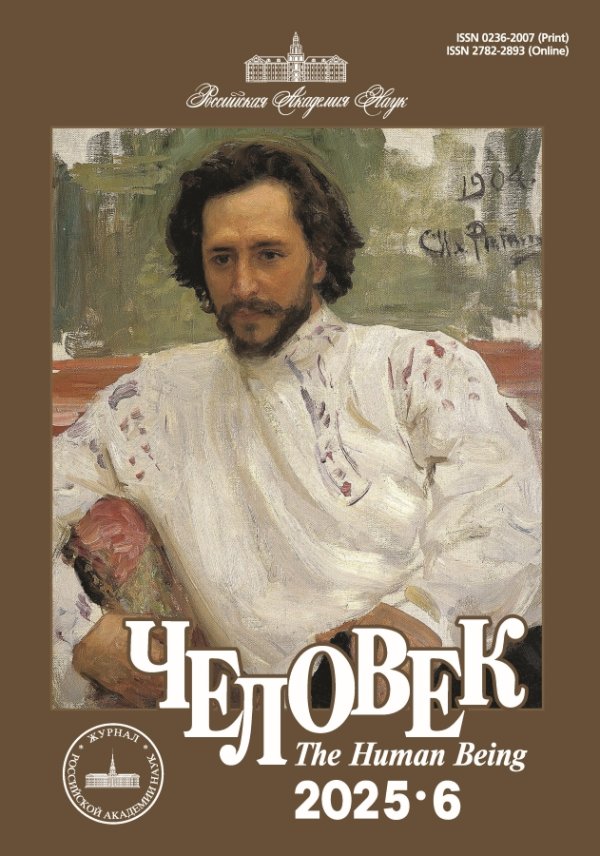Urban-Related Identity — How to Measure It?
- Authors: Reznichenko S.I.1, Rozhkova N.A.2
-
Affiliations:
- HSE University
- HRTech
- Issue: Vol 36, No 4 (2025)
- Pages: 58-73
- Section: Social practices
- URL: https://medbiosci.ru/0236-2007/article/view/316602
- DOI: https://doi.org/10.31857/S0236200725040031
- ID: 316602
Abstract
Identification with the city not only supports the psychological well-being of the resident, but also becomes a resource for the development of the city, because committed citizens are more motivated to preserve and protect their city. Meanwhile, there are few ways to measure this phenomenon, and the available ones have limitations or have not been tested on the Russian-speaking population. This article is devoted to the validation of one of the most frequently mentioned methods in environmental psychology — the Urban-Related Identity Scale developed by M. Lalli and translated in Russian by A. Miklyaeva and P. Rumyantseva. The sample consisted of 242 people aged 18-70 years (Mage=35.50 years, SDage=14.29 years; 59.5% women) living permanently in Russian cities and large towns. It was revealed that the original five-factor structure of the scale is not reproduced in Russia; instead, three components of urban identity were identified: External value, Belonging to a city and Goal setting. The modified version of Urban-Related Identity Scale obtained in this research has high structural and construct validity and reliability. The intensity of manifestations of urban identity is positively related to a person’s age, duration of residence, his or her tourist experience, and size of the city, but negatively related to the desire to leave the city.
About the authors
S. I. Reznichenko
HSE University
Email: sreznichenko@hse.ru
4, Armyanskii st., Moscow, 101000, Russia
N. A. Rozhkova
HRTech
Email: narozhkova53@gmail.com
Serebryannikovskaya st., Moscow, 630007, Russia
References
- Litvina S.A., Murav’eva O.I. Oprosnik identichnosti s gorodom: razrabotka, validizatsiya, proverka nadezhnosti [City Identity Questionnaire: Designing, validating and reliability testing]. Vestnik Novosibirskogo gosudarstvennogo pedagogicheskogo universiteta [Novosibirsk State Pedagogical University Bulletin]. 2018. Vol. 8. № 1. P. 73-91. doi: 10.15293/2226-3365.1801.05
- Miklyaeva A.V., Rumyantseva P.V. Gorodskaya identichnost' zhitelya sovremennogo megapolisa. Resurs lichnostnogo blagopoluchiya ili zona povyshennogo riska? [Urban identity of a resident of a modern megapolis. Resource of personal well-being or a zone of increased risk?] Saint-Petersbug: Rech' Publ., 2011.
- Reznichenko S.I. Privyazannost’ k mestu i chuvstvo mesta: modeli i fenomeny [Attachment to Place and Sense of Place: Models and Phenomena]. Sotsial’naya psikhologiya i obshchestvo [Social Psychology and Society]. 2014. Vol. 5. N 3. P. 15–27.
- Reznichenko S.I. Fenomenologiya privyazannosti k domu v raznye vozrastnye periody: dis. … kand. psikhol. nauk. [Phenomenology of home attachment in different age periods: Diss. ... PhD, Psychology] Moscow: Moscow State University of Psychology and Education Publ., 2016.
- Shibaeva L.V., Khokhlova N.I., Pokatilovskaya E.N. Tsennostno-affektivnye sostoyaniya gorozhan kak faktor vliyaniya na ustoichivost’-neustoichivost’ zhiznesposobnosti goroda [Value-affective states of citizens as a factor of influence on sustainability-instability of the viability of the city]. Mezhdunarodnyi zhurnal meditsiny i psikhologii [International Journal of Medicine and Psychology]. 2022. Vol. 5. N 1. P. 98–104.
- Åkerlund U., Sandberg L. Stories of Lifestyle Mobility: Representing Self and Place in the Search for the ‘Good Life.’ Social & Cultural Geography. 2015. Vol. 16. Iss. 3. P. 351–370. doi: 10.1080/14649365.2014.987806
- Belanche D., Casaló L.V., Flavián C. Understanding the Cognitive, Affective and Evaluative Components of Social Urban Identity: Determinants, Measurement, and Practical Consequences. Journal of Environmental Psychology. 2017. Vol. 50. P. 138–153. doi: 10.1016/j.jenvp.2017.02.004
- Bergami M., Bagozzi R.P. Self-Categorization, Affective Commitment and Group Self- Esteem as Distinct Aspects of Social Identity in the Organization. British Journal of Social Psychology. 2000. Vol. 39. Iss. 4. P. 555–577.
- Casakin H., Hernández B., Ruiz C. Place Attachment and Place Identity in Israeli Cities: The Influence of City Size. Cities. 2015. Vol. 42. P. 224–230. doi: 10.1016/j.cities.2014.07.0
- Félonneau M.-L. Love and Loathing of the City: Urbanophilia and Urbanophobia, Topological Identity and Perceived Incivilities. Journal of Environmental Psychology. 2004. Vol. 24. Iss. 1. P. 43–52. doi: 10.1016/s0272- 4944(03)00049-5
- Goregenli M., Karakus P., Gokten C. Acculturation Attitudes and Urban-Related Identity of Internal Migrants in Three Largest Cities of Turkey. Migration Letters. 2016. Vol. 13. Iss. 3. P. 427–442. doi: 10.59670/ml.v13i3.294
- Hu L.T., Bentler P.M. Cutoff Criteria for Fit Indexes in Covariance Structure Analysis: Conventional Criteria Versus New Alternatives. Structural Equation Modeling. 1999. Vol. 6. P. 1–55. doi: 10.1080/10705519909540118
- Jorgensen B.S., Stedman R.C. Sense of Place as an Attitude: Lakeshore Owners Attitudes Toward Their Properties. Journal of Environmental Psychology. 2001. Vol. 21. P. 233–248.
- Karakus P., Goeregenli M. Linking Place Attachment with Social Identity Orientation: An Examination of the Relationship Between Place Attachment, Social Identity Orientation and Integration to City. International Journal of Psychology. 2008. Vol. 43. Iss. 3–4. P. 406.
- Lalli M. Urban-Related Identity: Theory, Measurement, and Empirical Findings. Journal of Environmental Psychology. 1992. Vol. 12. Iss. 4. P. 285–303.
- Lee C.K.C., Yap C.S.F., Levy D.S. Place identity and Sustainable Consumption: Implications for Social Marketing. Journal of Strategic Marketing. 2016. Vol. 24. Iss. 7. P. 578–593. doi: 10.1080/0965254x.2016.1148758
- Lewicka M. In search of roots: restoring continuity in a mobile world. Place Attachment; Advances in Theory, Methods and Applications, 2nd ed., Manzo L.C., Devine-Wright P. (eds.). London: Routledge, 2013. P. 49–60.
- Mansour H.M., Alves F.B., da Costa A.R. A Comprehensive Methodological Approach for the Assessment of Urban Identity. Sustainability. 2023. Vol. 15. 13350. doi: 10.3390/su151813350
- Maricchiolo F., Mosca O., Paolini D., Fornara F. The mediating role of place attachment dimensions in the relationship between local social identity and well-being. Frontiers in Psychology. 2021. Vol. 12. Article 645648. doi: 10.3389/fpsyg.2021.645648
- Masterson V.A., Stedman R.C., Enqvist J., Tengö M., Giusti M., Wahl D., Svedin U. The contribution of sense of place to social-ecological systems research: A review and research agenda. Ecology and Society. 2017. Vol. 22, Iss. 1. doi: 10.5751/es-08872-220149
- Moreno C., Allam Z., Chabaud D., Gall C., Pratlong F. Introducing the “15-Minute City”: Sustainability, Resilience and Place Identity in Future Post-Pandemic Cities. Smart Cities. 2021. Vol. 4, Iss. 1. P. 91–111. doi: 10.3390/smartcities4010006
- Peng J., Strijker D., Wu Q. Place identity: How far have we come in exploring its meanings? Frontiers of Psychology. 2020. Vol. 11. Article 294. doi: 10.3389/fpsyg.2020.00294
- Rijnks R.H., Strijker D. Spatial Effects on the Image and Identity of a Rural Area. Journal of Environmental Psychology. 2013. Vol. 36. P. 103–111. doi: 10.1016/j.jenvp.2013.07.008
- Twigger-Ross C.L., Uzzell D.L. Place and Identity Processes. Journal of Environmental Psychology. 1996. Vol. 16, Iss. 3. P. 205–220. doi: 10.1006/jevp.1996.0017










